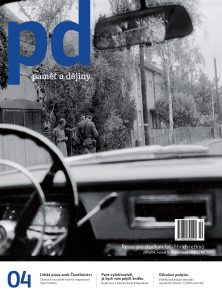
Mluvčí Charty 77 objektivem Státní bezpečnosti
Výběr fotografií ABS z připravované výstavy Tváře Charty 77
This paper contains unique photos of the Charter 77 speakers shoot by the State Security Service in Czchoslovakia.
More...We kindly inform you that, as long as the subject affiliation of our 300.000+ articles is in progress, you might get unsufficient or no results on your third level or second level search. In this case, please broaden your search criteria.

Výběr fotografií ABS z připravované výstavy Tváře Charty 77
This paper contains unique photos of the Charter 77 speakers shoot by the State Security Service in Czchoslovakia.
More...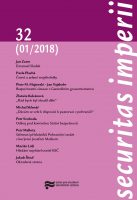
This case study focuses on Operation Kühnel, a well prepared and in terms of results extraordinarily successful provocative operation carried out by the security forces in the initial phase of the Communist regime. Although most likely the most significant intervention by the State Security (StB) against staff and functionaries at the headquarters of the National Socialist Party (NSP), the operation is not widely known; in view of its scale and significance it is surprising that experts have not hitherto devoted due attention to it. As early as in the post-February 1948 period, the organizational secretary of the Czechoslovak Socialist Party headquarters, Josef Kühnel (1900–1962), oversaw illegal groups, mainly focused on intelligence, preparing the way for a “new” NSP that was to be ready once a political coup had taken place. Kühnel was under orders from Petr Zenkl, the former chairman of the NSP. In early April 1949 Kühnel witnessed a number of arrests among his collaborators, began to fear for his own safety and started planning to flee the country. The State Security was informed about his intentions and decided to use him in an extensive sting operation. In this way, the StB successfully infiltrated illegal organizations connected with the former NSP, monitored them for a long time (even conducting their activities) and in the end gradually wiped them out once their activities ceased to be in the StB’s interest. The operation was based on so-called “separation”, which in reality entailed the secret kidnapping of Kühnel by StB officers posing as members of the illegal resistance movement. Kühnel was later used as a source of information for intelligence purposes. The operation culminated with a ruse today known under the name False Frontier Stone. This centred on a fake border crossing created by the State Security prior to the arrest and conviction of Kühnel. Operation Kühnel, which is closely connected with other sting operations Scout and Svetlana, highlights the existence of an active anti-Communist resistance and proves the existence of a well-developed organizational structure of resistance within the NSP. It is also indisputable and verifiable proof of the ruthlessness of the StB, who in their endeavours to control and manage existing illegal groups commonly resorted to sophisticated intelligence ruses and unlawful provocative methods. In the context of international developments in this period it also shows how deeply members of the Third Resistance were convinced that the Communist regime in Czechoslovakia would collapse.
More...
In the 1950s it wasn’t only people wishing to live in freedom or searching for salvation from the repression of the Communist regime who streamed across the Iron Curtain – so did those who had decided to take on the totalitarian regime. This most frequently occurred within the framework of Western organised intelligence groups. They sent into Czechoslovakia what were called couriers (the State Security dubbed them “cross-border agents”), tasked with espionage missions, building an illegal resistance network and leading persecuted individuals to safety. The ever more closely guarded frontier between the two worlds therefore became an exposed “front line” of the cold War. The study focuses on an event that took place on the Czech-Bavarian border on the night of 13 to 14 July 1950, when courier Josef Mašek, alias Josef Marek, attempted to cross it near the German settlement of Schnellenzipf. On the Czech side, around 200 metres from a border stream, he ran into a Border Guard patrol from the unit at Kunžvart (today Strážný), comprising private first class Josef Příhoda and private Vojtěch Švarc. Mašek was killed in a shootout and later secretly buried under a false identity. Using the available sources, the author recreates this tragic event and the background to it as well as placing the case in the broader context of the intelligence operations of Czechoslovak anti-Communist exiles in the early 1950s. His research also succeeded in uncovering Josef Mašek’s final resting place.
More...
This study turns the spotlight on internal party communication within the Communist Party of Czechoslovakia (CPC) at the regional and district level in the period from autumn 1950 to spring 1951 when, within the framework of a so-called intensified class struggle, there were great efforts to uncover enemies within the party. It also explores how regional party forums (conferences, committees, and presidia), intended for debate and discussion, functioned during their trials. At the same time, it examines the actions of various party actors: HQ functionaries, regional and district elites, pre-war Communists and the broader party caucus. It details their response to the ongoing campaign and their specific motivations and interests. In addition it attempts to evaluate their significance during so-called purges and what their positions say about the then CPC, its state and the degree of legitimacy it possessed among members.
More...
The subject of the paper is protests by the membership base of the Communist Party of Czechoslovakia (CPC), which intensified at the turn of May and June 1953 in connection with preparations for a currency reform. Representatives of various groups used the party organisation as a platform of communication by which to express their views, leading to tumultuous discussions at party meetings. Well-off industrial workers, who lost considerable savings and demanded advantageous exchanges of large amounts for members of the working class, protested against the reforms. So did poor Communists, who, by contrast, demanded an equitable approach and tougher interventions against the rich, regardless of their class origins. Some of those involved in the discussion blamed the crisis on members of the former bourgeoisie, while others directed their ire towards the leaders of the post-1948 regime. For a third group there was little difference between the two elites.
More...
In August this year it will have been 50 years since the armies of five Warsaw Pact states invaded Czechoslovakia. Nevertheless, new recollections of eye-witnesses, which help create and refine our picture of those events, continue to appear. At the time of the Prague Spring Ivo Masařík was 27 years old, had completed his university education and was working at the General Directorate of the Fire Service in Prague. He began keeping notes of what he had seen on the first day of the occupation, 21 August 1968, when he learned from the radio that troops were occupying the country. Like thousands of other citizens he took to the streets. He didn’t become actively involved in the resistance against the occupiers but instead spent days crisscrossing central Prague, recording and photographing the unfolding occupation. During the day he observed and in the evenings he wrote notes, which literally constitute a first-hand account. Masařík’s photographs from that time are being made public for the first time.
More...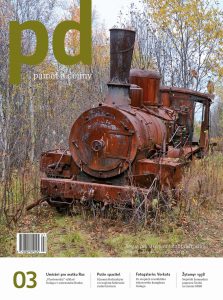
This paper contains many interesting pictures shoted, choosen and searched by the historian Adam Hradilek who is focusted on the history of gulags and relatad topics.
More...
A baker by trade, Pavel Hron joined the Communist Party in the 1930s but only became very active in politics after the end of WWII and via various posts at local level worked his way up to high politics. He was a member of the Central Committee of the Communist Party of Czechoslovakia, the Chamber of the People of the Federal Assembly, the Kolder Commission and the National Assembly, as well as serving for many years as chairman of the party’s Central Control and Inspection Committee. It is surprising that the life story of this relatively important politician has not previously been examined in detail.
More...
On the night of 12 April 1952 a Public Security patrol caught red-handed a man who was writing the letters TGM one metre high by spraying lime from a rubber bulb for enemas at a fork in the road between the villages of Křimice and Vejprnice near Plzeň. In detention Stanislav Hrabinský confessed that he had for several years been intently writing the initials TGM around the city and destroying Communist propaganda signs with paint. That evening he had written seven signs in Plzeň and its environs.
More...
A murderer hides in a field. That was the title of episode 10 of the TV series Thirty Cases of Mayor Zeman. Though the story differed in many ways from the realty and served as Communist propaganda, a shootout with Security officers did actually take place in a field. Following an attack at the school in Babice on 2 July 1951, four young men hid in the rye in a field in Bolíkovice, which lies two or three kilometres from Babice. The next day they were surrounded and came under fire. Two of them were shot dead, including the operation’s organiser, Ladislav Malý.
More...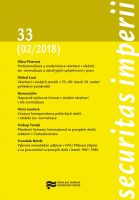
The present study focuses on one of the aspects of the normalization of prison life – the prison correspondence of political prisoners as the most common and the most widespread official (sometimes also unofficial) creative verbal expression behind bars which is, however, highly regulated and censored. The author describes the complexity of the supervision of this type of communication, with an emphasis on the concurrence of various censorship interventions, outlining the basic typology of interventions and systemic limitations of correspondence in the normalization correctional institutions or, as the case may be, in remand prisons, their consequences and defensive mechanisms of the affected authors. In spite of both internal and external censorship interventions, the writing of prison letters remained a key creative and often even self-preserving mental manifestation of the prisoners. However, prison letters were important not only for the direct participants in such communication, but also for the wider cultural-opposition public at that time, and they were commonly disseminated in samizdat copies or read out together. Nowadays, with hindsight, many prison letters, which, with few exceptions, were not primarily conceived as literary or philosophical, can be perceived as distinct works of art representing the specific literary genre of prison epistolography, which in the broadest sense can be characterized as a literary task to write something when one actually cannot write anything.
More...
In the spring and summer 1949 the exponents of the regime in the districts of Louny and Melnik were afraid. Unknown and elusive culprits were carrying out extensive illegal activities targeted especially against specific architects of injustice from the local staunch communists. The danger would come at night, under cover of darkness.
More...
Political prisoners serving their sentence in the 1950s remembered the guards they met in various prison facilities in Czechoslovakia. Their testimony was always given much later, in some cases in 1968 but mostly after November 1989. The list prepared by Pravomil Raichl is authentic in this respect. He wrote it in February 1952 when he was on the run from Leopoldov prison, and this valuable document tells its own story.
More...
Not only notes from prisons and labour camps, but also poems can become an authentic testimony of life behind bars and barbed wire. Perhaps not as a precise description of living experience of life there, which was so cruel and remorseless to the political prisoners that many of them sought refuge in their memories of their closest and most beloved ones… Just like Stanislav Kosik, whose verses emerged at the time when Czechoslovakia became, as Vaclav Smejkal put it, a land crowned with barbed wire. It was not by chance that the small notebook in which the young political prisoner wrote his poems is “adorned” with barbed wire on many of the pages. For him, this was not only the symbol of imprisonment, the enclosed space guarded with guns, but an obstacle on the way to freedom, observed every day and perceived physically.
More...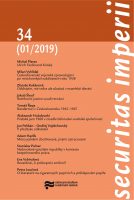
This work focuses on the phenomenon of Banderites (Banderovtsy, also known as OUN – Organization of Ukrainian Nationalists and UPA – Ukrainian Rebellious Army) in Czechoslovakia in 1945–1947. The actual threat they posed to the Czechoslovak state was exaggerated and propagandistically misused by the communists in their fight against other political entities in Czechoslovakia long before February 1948. In the countries where the Banderites were active, their activity is still perceived controversially and tendentiously. The perceptions are influenced by the nature of the communist regime that ultimately ruled and by how this issue was handled. What was initially an unambiguous conflict stemming from the problematic coexistence of some Eastern European nations was eventually misused to create a fake legend and a targeted campaign. With more than 70 years of perspective, the topic of Banderites is still viewed through this prism in many cases, and it is probably a matter of time when the issue can finally be viewed free of distorting clichés.
More...
The study maps the period from the spring of 1969 to the early 1970 as Husák’s suite established itself at the helm of the Communist Party of Czechoslovakia (KSČ) and the state. Its stance towards Yugoslavia was ambiguous. The conservative and dogmatist members of the new regime considered the Yugoslav “revisionists” to be the inspiration for and the supporters of the Prague Spring. A part of the normalisation suite including Gustáv Husák himself wished to renew good relations with Belgrade and obtain a gesture of recognition from it to boost its own legitimacy. The Yugoslav leaders insisted on condemning the Soviet invasion in August 1968 while accepting the new status quo. They tried to avoid accusations of actively interfering with Czechoslovakia’s internal matters since Yugoslavia’s own foreign policy strategy was based on the principle of non-interference. Czechoslovak-Yugoslav relations were influenced by the Soviet Union, which normalised its relations with Yugoslavia for pragmatic reasons again after a brief period of deterioration. However, both Soviets and Yugoslavs used the Czechoslovak platform to present more critical and offensive stances than they would show to each other. In effect, Czechoslovak-Yugoslav relations remained markedly more reserved than Soviet-Yugoslav relations of the period. The arrival of new power structures in Prague did not affect the practical level of the relations, in particular in economic terms, since both sides were extremely interested in cooperation. The study also analyses the Slovak aspect of relations to Yugoslavia and the impact of political matters on social phenomena such as tourism and travel.
More...
This paper describes a special case of so-called Tuzex trades in socialist Czechoslovakia. Tuzex stores were opened to sell luxury foreign and selected domestic “export” products. Only hard currency or special vouchers (Tuzex Crowns – TK, “bon/bony”) were accepted as means of payment. Tuzex stores were originally intended for customers such as foreigners or Czechoslovak citizens, who had official access to foreign currency (specialists working abroad, etc.). Eventually, however, a huge black market with foreign currency and Tuzex vouchers was emerged, allowing “ordinary people” to buy the desired foreign electronics, clothes, food, cars, etc. at Tuzex stores. The aim of the study is to analyse the causes of the establishment Tuzex in the late 1950s and its development and significance for the Czechoslovak centrally planned economy. From humble beginnings, the number of Tuzex stores, as well as foreign money revenues, grew until the late 1980s. In addition to the economic principles of Tuzex, the range of goods sold or its structure and staff, the text also focuses on undesirable but partially tolerated forms of crime that are related to the existence of Tuzex.
More...
The communist coup in 1948 brought a pivotal change in Czechoslovakia’s legal policy related to the possibility of leaving the country freely. The Communist Party of Czechoslovakia (KSČ) did not understand this option as a matter of a free citizen’s choice – in contrast, it considered the maximum possible restriction of this principal human right to be a principal interest of the society. The reasons stemmed from ideological, security and economic considerations. Without a doubt, the political stance of the Soviet Union – which took a resolutely negative stance to the option of leaving one’s home country – played a role as well. All of the factors eventually showed in the legal policy, legislation and the application of law by Czechoslovak authorities. First, it was the matter of passport and emigration agenda, with the unusual involvement of security authorities including the State Security (StB). This institutional measure opened up the opportunity for transferring cases from administrative to penal law. After 1948, penal regulations treated unauthorised desertion of the republic as a crime against the country, rather than as an administrative offence. Logically, investigation was on the agenda of StB. The socialist security law also defined the modus operandi of the Czechoslovak national border. It gave broad authorisations to the Border Guard including the use of firearms on citizens leaving the country without authorisation. By the same token, the border was “secured” using equipment that actually killed hundreds of people. Not all of the successful émigrés stayed abroad permanently. Some of them came back to Czechoslovakia for various reasons, exposing themselves to penal repression and permanent police surveillance. The state tried to attract émigrés back using periodical campaigns promising them no punishment under amnesty. The great majority of the people who left in 1948 and 1968 did not avail themselves of this apparent act of good will, staying abroad permanently. Then, the regime at least seized the property they left behind. In effect, attempts at leaving the socialist Czechoslovakia were acts of civic courage that involved many severe consequences, and as such they deserve admiration.
More...
The study discusses the various forms of material and other assistance that the members and friends of the Ackermann-Gemeinde civic association extended to Czechoslovak Roman Catholics for decades. They would mostly send hundreds of parcels with targeted help (selected books, dried fruits, medications, money, etc.), cars for priests, finance for refurbishing church buildings in the borderland, gifts for ordinees, etc. The study also focuses on the attention that State Security (StB) paid to the organisation, in particular to its representatives, Adolf Kunzmann (operation “Revanš/ Revenge”) and Franz Olbert (operation “Náhradník/Substitute”). As part of the operation, StB interrogated dozens of priests and active laypeople in the 1970s. Among other sources, the study draws on documents from the Ackermann-Gemeinde archive in Munich and selected StB files deposited in the Security Services Archive in Prague. In addition, several persons on both sides were interviewed for the study.
More...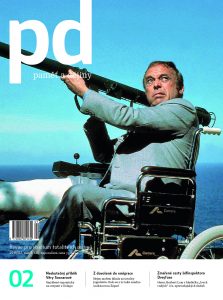
During the period of the so-called Normalisation of Society in Czechoslovakia, Yugoslavia had a magical appeal for Czechoslovak citizens as a dreamed-of yet not totally inaccessible country. It was not just the beauty of the Adriatic shores that attracted them. They also appreciated the chance to purchase western consumer goods and a more liberal atmosphere in society. They justifiably considered Yugoslavia as an imaginary window onto the western world, which allowed them to catch at least a glimpse of its well-being and freedom. However, some made this window their door. Every year, hundreds or even thousands of Czechoslovak citizens took advantage of the relatively free regime on the Yugoslavian border with Italy and Austria to embark on their journey to permanent emigration.
More...